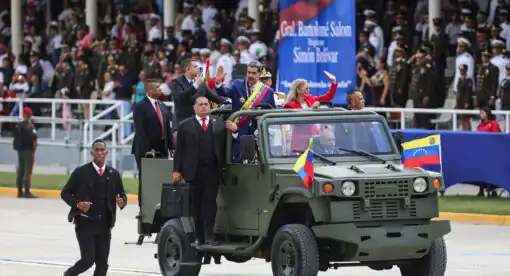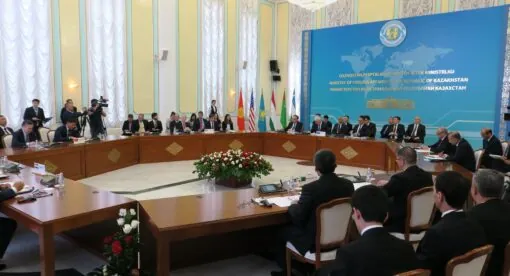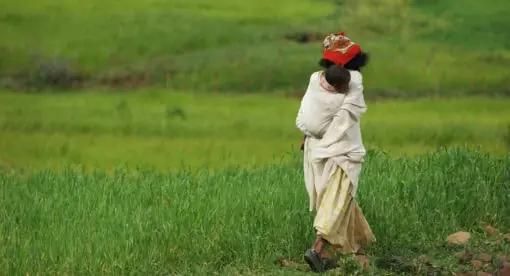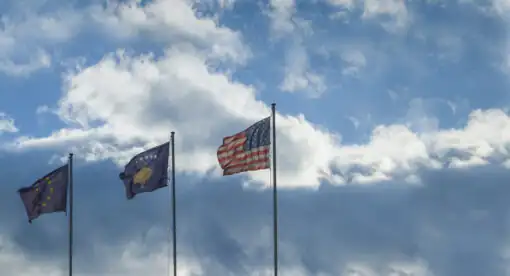In this episode of the Contours podcast, host Eugene Chausovsky talks with Richard Giragosian, founding director of the Regional Studies Center. Together, they discuss the implications of a potential peace agreement between Armenia and Azerbaijan, the changing roles of foreign powers in the region, and what the future holds for connectivity throughout Eurasia.
Eugene Chausovsky:
Hello, everyone, and thank you for joining us for the New Lines Institute for Strategy and Policy Contours Podcast Series. I’m your host for today, Eugene Chausovsky, and I’ll be talking to Richard Giragosian about Armenia-Azerbaijan relations and their impact on geopolitical dynamics throughout Eurasia and beyond.
Richard is the founding director of the Regional Studies Center, an independent think tank located in Yerevan, Armenia, and is also a guest lecturer for the NATO Defense College in Rome. He has over 35 years of policy experience in the fields of security and international relations, and has served as both a visiting professor at the College of Europe’s Natolin campus and as senior expert at Yerevan State University’s Center for European Studies. Richard, welcome to the show.
Richard Giragosian:
Thank you.
Eugene Chausovsky:
So, Richard, we’ve seen a lot of activity in recent months in the Eurasian theater, everything from the Russia-Ukraine conflict to the ongoing war in Gaza and all the reverberations throughout the Middle East, but there’s actually another region located in between these two geopolitical hotspots that hasn’t received as much attention, yet it could be quite consequential moving forward, and that is the Caucasus region. We’ve seen especially important activity happening between Azerbaijan and Armenia, which is where you’re based.
So let’s get into some of the dynamics that are currently playing out and what that means. So just this week we saw Azerbaijan’s foreign minister saying that Azerbaijan believes that there is a historic chance to ensure a strong peace in the region between Baku and Yerevan, but at the same time we also saw that Azerbaijan has accused Armenia of firing at some of its positions along the border, which Armenia has strongly denied. So maybe to get us started, can you give us a brief background on this conflict between Armenia and Azerbaijan and where it stands currently?
Richard Giragosian:
Well, first, if we look at the broader strategic context, this South Caucasus region is comprised of three distinct countries, the former republics of Georgia, Armenia and Azerbaijan. The strategic significance of the region, beyond energy, is actually largely driven by the region’s role as an arena of competition and even confrontation between three much larger regional powers: Russia, Turkey and Iran. Against that backdrop, Armenia is sandwiched in between Turkey and Azerbaijan and has very tense relations and a difficult time in terms of the greater neighborhood, but it was actually in 2020 where Azerbaijan launched a very successful war for 45 days against Armenia and the disputed Armenian enclave of Nagorno-Karabakh.
After that difficult post-war defeat, Armenia and Azerbaijan have been engaged in, at times, difficult diplomatic negotiations trying to forge a post-war degree of stability. This is despite the outside role of Turkey and the interference of Russia. Nevertheless, Armenia and Azerbaijan now are moving quickly towards securing a bilateral peace treaty, and, in many ways, there is a greater degree of stability in Armenia based on its demonstrable democratic credentials. So, in a nutshell, that’s where we are today.
Eugene Chausovsky:
Great. Thanks very much, Richard. So a lot to unpack there that you’ve mentioned. So as you mentioned, there was a pretty significant military conflict back in 2020, but I should note that this dispute between Armenia and Azerbaijan over Nagorno-Karabakh and some surrounding territories goes back to the late Soviet period back in the late ’80s.
There was a big war there in which Armenia was able to take control of what was then Soviet territory, and we’ve had, essentially, several decades of this frozen and sometimes not so frozen conflict, which, as you mentioned, has shifted in a strategic way in 2020, which then set the stage for these negotiations to happen between Baku and Yerevan. So I’m curious to get your thoughts in terms of what has been the driving forces between these negotiations and what are the main issues at stake here?
Richard Giragosian:
Well, that’s a very good question because we now see an unprecedented new geopolitical landscape, the Nagorno-Karabakh conflict. It was an Armenian majority populated enclave within Azerbaijan that, during the Gorbachev period, the waning days and years of the Soviet Union, erupted in pursuit of self-determination. This is very interesting, because Nagorno-Karabakh, although it didn’t join Armenia proper, it was never a part of independent Azerbaijan either. What’s most notable are two factors.
One, is this Nagorno-Karabakh conflict. A war in the ’90s in which the Armenian side was victorious. This conflict tended to distort the statehood, democratization and development of both Armenia and Azerbaijan from the very beginning, and the second factor explaining this new geopolitical reality is Azerbaijan’s successful use of force and its military victory recapturing the Armenian enclave of Nagorno-Karabakh and driving out, expelling over 100,000 Armenians.
This brings us to where we are today. Post-war diplomatic negotiations are now focused on state-to-state relations and are no longer about self-determination or the Nagorno-Karabakh conflict. Rather, its bilateral diplomacy aimed at ensuring territorial recognition, a delineation and demarcation of borders, and the reopening of important trade and transport routes.
Eugene Chausovsky:
Great, thanks so much. I think this … We’ll get into the trade and transport routes in just a minute, but I think what you mentioned about this bilateral state-to-state negotiations is a really important point because, basically, in the preceding years, going back to the early ’90s, essentially, we had almost 30 years of negotiations happening ever since that original peace agreement, or at least cease-fire agreement that was struck, I believe, in ’94. A lot of those negotiations were mediated by external players, several of which you’ve already mentioned, that are quite influential within the Caucasus, and that includes Russia, that also includes Western countries, like the U.S. and European countries like France.
But there was a lot of obstacles, I think, that we saw. Clearly, because those negotiations didn’t produce a peace, but it rather ended up going into a military escalation, essentially, where Azerbaijan settled, in a way, things on the battlefield. Now we have those direct talks happening, and seemingly making a lot more progress than was the case when there was that external mediation. So I was wondering if you can speak a little bit about that. What was the role of these external players in the mediation and on the ground as well?
Richard Giragosian:
Well, that’s a good question, and we have two specific trends or developments related to this context. First of all, throughout the years of independence, the diplomatic engagement of the West and Russia’s diplomatic engagement was primarily focused on the Nagorno-Karabakh conflict. In other words, diplomacy has never been a bilateral effort between Armenia and Azerbaijan proper. Rather, it was the clash or contradiction between self-determination versus territorial integrity, a contradiction that has never been resolved peacefully.
The second related factor here in terms of outside engagement is there is no outside engagement. Both the West and Russia are no longer either mediating and barely facilitating diplomacy. These are negotiations between Armenia and Azerbaijan limited also by the focus on bilateral state or interstate relations, which is also more promising and much easier. Having said that, the second new reality is Russia’s role. Russia remains distracted and overwhelmed by its failed invasion of Ukraine, and this vacuum of Russian weakness and a lack of influence has also encouraged the parties themselves to directly negotiate.
So, all in all, this is an opportunity for returning diplomacy to the region itself, but I am worried over two distinct scenarios. The first concern I have is not over diplomacy, which is a welcome development after Azerbaijan’s use of force, but I’m worried over too little investment or attention in the day after any peace treaty is signed. There’s little to reassure a durable, lasting peace, and unfortunately, there is no deterrence to prevent a resumption of hostilities.
My second concern here is the war of 2020, and in September 2023, Azerbaijan’s military victory over Nagorno-Karabakh, these offer dangerous precedents. Seemingly, a vindication of the use of force over diplomacy, and second, a precedent validating authoritarian power over democracy, which undermines Western values. So in effect, where we are today is diplomatic engagement, but we need to invest much more in ensuring a lasting, durable peace rather than a punitive peace treaty being imposed.
Eugene Chausovsky:
Right. So that’ll be really important to see those dynamics play out moving forward, but I just wanted to go back for a moment, and you mentioned the role of Russia, which I think is quite important here to talk about, and the connection to the domestic political situation in Armenia, which you also briefly touched upon. But we’ve seen, basically, one of the driving forces, at least from my view, of these negotiations and of the relative success of them, or at least the progress of these negotiations between Armenia and Azerbaijan, is the rise of the current leader of Armenia, the Prime Minister, Nikol Pashinyan.
We saw him come to power in, essentially, a revolution of sorts after large scale protests against the previous government in Armenia, and we’ve seen a lot of movement happen since then, including on Nagorno-Karabakh, but also Armenia’s relations with some of its other traditional partners or traditional countries that it engages with, including from the West, but really a worsening of ties with Russia, and I think a big part of that is Nagorno-Karabakh, and, essentially, that Russia had, for quite some time, played the role of security guarantor for Armenia. It had hosted troops within Armenia. It had, basically, provided security along Armenia’s borders, not only with Azerbaijan, but also Turkey.
But we saw the limitations of that, particularly in 2020, and then 2023 when Azerbaijan was able to, essentially, take, militarily, by force a lot of those territories in and around Nagorno-Karabakh, despite the fact that there were Russian troops present in the region. Also, that, essentially, exposed that relationship between Armenia and Russia, which already had some, I think, challenges to it. So in part, this is a reality that Armenia had to take into account, I think, that’s been part of the driving force between those negotiations and also now what has become a warming of ties, or at least an exploration of ties, between Armenia and other external players, particularly the West. So I was wondering if you could speak to that a little bit.
Richard Giragosian:
Sure. This is one of the most important recent developments in terms of Armenia belatedly, yet demonstrably, reasserting its independence and defending sovereignty after years of dangerous over-dependence on Russia. Much of the driver of this belated recognition of Russia’s problematic role is Russia’s failure to meet expectations. For years, Russia has taken Armenia for granted. Armenia has received far too little in return, but the war of 2020, even with the deployment of Russian peacekeepers, did nothing to meet Armenian security guarantees, and for Armenia, I would say the beginning of this crisis with Russia began in 2018 where we saw a Velvet Revolution, so-called, in Armenia, which was more important, not as a revolution in the classical sense, but as a rare victory of non-violence and people power, which is exactly the opposite of Russia’s preferred model of authoritarian elites.
That is important in understanding that the Armenian government from day one was neither favored nor a favorite of Moscow, and it began to shape developments in Armenia, where Armenia is now endowed with a rare commodity of legitimacy and democratic credentials, pushing and pressing for the country to stand up to Russia. This is what’s called a diversification. In other words, looking beyond Russia, and not just the West, but trying to gain and garner more and different security partners, including India, which was the one and only arms procurement partner in this post-war period.
Now, what’s interesting is what’s coming. I’m concerned that, no matter what happens in Ukraine, we do expect to face an angry, vengeful Russia lashing out at all of her neighbors throughout the near abroad. This is something in terms of resiliency that we have to prepare for now. Nevertheless, Armenia, in recent weeks, has also succeeded in forcing the withdrawal of Russian border guards from the Armenian airport and from positions along the Armenian border with Azerbaijan. I do expect a more determined effort to further strengthen Armenian independence, especially in the wake of Russia’s withdrawal as an active player in the region.
Eugene Chausovsky:
Yeah, that’s quite interesting. So it sounds like what you’re describing, Richard, is, essentially, a shifting regional landscape. That traditional relationship, which was already fraught with some challenges between Armenia and Russia has changed significantly from at least allies on paper to now, potentially, I don’t want to say adversarial role, but there’s going to be, as you said, that Russia will not take such a shift lightly, whether it’s Armenia’s outreach to countries in the West, you also mentioned India playing a role, other actors becoming more involved, a more multipolar regional landscape, if you will.
At the same time, we’ve seen how this has translated not only into Armenia’s relationship with Azerbaijan, but all of the ripple effects that it has entailed from a security perspective, which we’ve already mentioned, but also from an economic one, and you touched on this a little bit earlier, but I was wondering if you could speak to some of the regional connectivity efforts that these negotiations have sparked.
I mean, you mentioned this region being rich in energy, particularly Azerbaijan, but also some of the Central Asian countries across the Caspian Sea. Ever since Russia’s full-scale invasion of Ukraine, Europe and the U.S. have been working to diversify from Russian energy, and this region could be and has been one potential source of that diversification. There’s a lot of infrastructure, road, rail, all this kind of things that could make this region quite dynamic economically. So I was wondering if you could speak to that issue as well.
Richard Giragosian:
Well, actually, there are three components of this geo-economic context of the region. First of all, one of the core elements of post-war diplomacy between Armenia and Azerbaijan centers on the planned restoration of trade and transport. In other words, Armenia granting road and rail access for Azerbaijan through Southern Armenia to reach its exclave of Nakhchivan and on to the border with Turkey. This is a win-win. This will elevate Armenia to more of a transit state, thereby countering the threat of isolation. In terms of the second factor of this geo-economic context, stage two of this restoration of road and rail involves Turkey’s reopening of its closed border with Armenia, which is a rare, positive game-changer in the South Caucasus.
I would say the third element here is also what kind of economic development. For Armenia, the most dynamic sector of the economy is the IT sector. This is especially important, in my opinion, because it’s the one area of the economy based on entrepreneurship and innovation, the future. Azerbaijan, however, despite its energy wealth, is also hindered by the lack of diversification, so-called Dutch disease, where they’re relying too much on revenue from gas and oil, and this is, unfortunately, fueling entrenched corruption within Azerbaijan.
But I would also say that in terms of the economics, I do think, for Armenia, the restoration of trade and transport is critical, strategically imperative, as the only way to regain deterrence. In other words, economic interconnectivity. Think of post-war France and Germany. Economic connectivity and interdependence is the most effective way for Armenia to regain that lost degree of deterrence.
Eugene Chausovsky:
Yeah, absolutely. I think that’s a really important point that you mentioned in terms of the restoration of trade and transport. It not only provides, as you said, a win-win for Armenia, for Azerbaijan, but also a lot of the surrounding countries in terms of reopening a lot of these connections, but it goes well beyond economics and providing that deterrence that you talk about as well for Armenia. So we see a lot of opportunities here, but of course, there are still some persistent challenges that we’ve already touched upon.
Obviously, I don’t think Russia is going to be very pleased with these developments, both on that bilateral relationship between Armenia and Azerbaijan. I mean, Russia’s role as mediator, one could argue, was more about preserving its own interest than actually trying to achieve any kind of peace between Armenia and Azerbaijan. So you can expect Russia to play a potential spoiler role on all of these developments, whether that’s bilateral or regional connectivity.
Iran, also, is a country that has played an important role and has been opposed to things like the Trans-Caspian corridor, or at least any efforts to send energy that bypass Iran or get more Western involvement in the region, and then you have, obviously, domestic factors within both Armenia and Azerbaijan, I would argue. There’s a lot of history of bad blood there. Hopefully, that can be overcome, and they are working towards very, I think, concrete and practical elements to build those ties, but you can’t rule out that that can be … at least face some resistance there.
So with all of that being said, I’m curious to get your thoughts on where you see things moving forward, both in the short term and in the longer term. In terms of the negotiation process, I mean, how realistic do you think an agreement between Armenia and Azerbaijan would be? What do you think that agreement could look like, and what are the potential stumbling blocks that you’re keeping an eye on?
Richard Giragosian:
Well, I’ll try to be a little more concise in my answer, but this is a complex issue. First, let’s look at Russia. In my opinion, Russia, in this region, is in a position of weakness, not strength, insecurity, not confidence, and after the neglect and distraction from its failed invasion of Ukraine, Russia has proven to be a rather unreliable actor in the region. It may be, at this point, too late for them to recover their lost influence or dominance.
The second element of this is Iran. It is most revealing how much we have spoken about Iran so far. We have not. This is revealing because Iran has neglected its traditional role as a regional power. Iran is distracted for its own domestic shortcomings and problems, but is also consumed by Gaza, in events in Syria, Iraq, and is looking east and west rather than north.
So Iran has pretty much neglected or forfeited its role as a traditional player, and what’s interesting about Armenia-Azerbaijan is also looking at Armenia-Turkey. The efforts now, diplomatically, in a positive way, is pursuing the normalization of relations between Armenia and Turkey with two objectives: diplomatic relations and reopening the border, and nothing more. In other words, Armenia-Turkey normalization is just that, seeking normal neighborly relations. It is like Armenia-Azerbaijan, not rapprochement, not reconciliation. This is the basic minimum currency we’re looking for with both Turkey and Azerbaijan.
So even though the starting point is not zero – it’s worse, it’s negative – any progress is welcome, and even direct diplomatic negotiations have been making progress, but my concern for Azerbaijan is, even with a peace treaty that right now is seeking a deadline of this coming November, even with a bilateral peace treaty, I am concerned because it won’t be enough for Azerbaijan. The nature of the father-to-son dynasty in Azerbaijan needs conflict. It needs an enemy to distract from the absence of democracy and the entrenched corruption, and I am worried that the maximalist position of Azerbaijan will resume and return, and for political purposes, domestic dividends will make or tempt Azerbaijan to return to more aggressive posturing regarding Armenia.
Eugene Chausovsky:
So that’s quite interesting. So it sounds like what you’re saying is that you actually do see some significant prospects for some kind of an agreement, and I believe you mentioned November. That will be the COP29 Summit that Azerbaijan is hosting in Baku, the UN Climate Conference, which very notably, Armenia both supported to be held there and I think will have a diplomatic representation. That could actually be the scenes for some kind of agreement or some kind of major talks either leading up to or during that summit. So that’s definitely something to pay attention to.
But despite all that, you still see a lot of challenges and potential risks going well beyond that, and I think that makes sense given all of the different complicating factors and all of the different players that are at stake here. I was just wondering, one other question that we didn’t touch upon, which is China. Do you see any role that China could play or has been playing in this region? Obviously, it hasn’t been as active as many of the others that we’ve talked about, but I know one of the driving forces of those regional connectivity efforts, the Middle Corridor, the so-called Middle Corridor between Europe and China, which the Trans-Caspian region plays quite a significant role, anything from Beijing that you think is worth watching here moving forward?
Richard Giragosian:
Well, I think everything from Beijing is worth watching. However, I would argue the South Caucasus is a little more remote and distant for China than, say, Central Asia, which is strategically not only in proximity, but is also of great significance. For the South Caucasus, China is engaged to a degree, but there are two recent developments. The first is an end to the Belt Road initiative, which was, after COVID and the outbreak of the Coronavirus, much less of a strategic priority for the Chinese. The second is an internal development within China, a consolidation of power by the Chinese leader, which also is somewhat challenged by the emergence of domestic economic fragility and vulnerability within China, coupled with the distraction of Taiwan as an issue and increasing tension with the U.S., and to a degree, the European Union. All these factors actually reduced Chinese influence, or even interest, in the South Caucasus.
We should expect, however, for Armenia, just as it’s looking to India, we also expect more engagement with China in order to actually go beyond the zero-sum game of Russia versus the West, and in this way, Armenia has learned a lesson from neighboring Georgia. That lesson is a realistic assessment that we’re not looking to replace Russia with the West, we’re not looking for NATO membership or even EU membership at this time. The West is not the answer to all of our problems. It’s much more of self-sufficiency and a small state strategy.
But the reason I’m optimistic is, over the medium to long term, Armenia is endowed with a rare degree of legitimacy, inferring self-confidence and statesmanship, and to be quite honest, Armenia has already survived the existential threats and the worst is over. I’m much more concerned over the future of Azerbaijan in terms of this father-to-son dynasty and the lack of sustainability for such a family enterprise.
Eugene Chausovsky:
Very interesting. So, yeah, it sounds like there’s definitely some potential opportunities for Armenia, for the negotiation process between Armenia and Azerbaijan and for those regional connectivity efforts within that broader Trans-Caspian region that we’ve discussed, but as you mentioned, Richard, a lot of persistent challenges as well ranging from domestic opposition to the influence of regional players like Russia, and of course, how we started, that this is a very dynamic region, not only within the Caucasus and within that Trans-Caspian region, but also a lot of different geopolitical hotspots that surround it, from the Russia-Ukraine conflict to the Middle East to tensions in the Indo-Pacific.
But, unfortunately, we’re going to have to end it there. I just wanted to say thank you very much to Richard for providing these valuable insights, and thank you all for listening. You can find more analysis related to Armenia-Azerbaijan relations and geopolitical dynamics in Eurasia on our website at newlinesinstitute.org. Thanks, once again, Richard. Take care and all the best.
Richard Giragosian:
Thank you.






